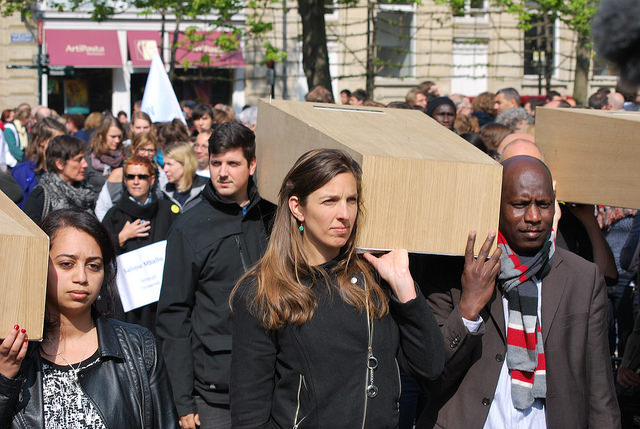Would whoever makes these decisions please stop treating refugees who drown in the Mediterranean as if they’re another earthquake or tsunami? This isn’t a natural disaster, it’s a hands-on human one. Anyway, even natural disasters like global warming aren’t merely natural now.
Margaret Wente in the Globe heaves a sigh and says “the world is full of far more victims of wars, violence … political repression than we can ever take in. All we can do is accept a lucky few, and try to discourage the rest.” She sounds like she already has donor fatigue. If anyone’s responsible it’s those bad behavers over in Africa and, maybe, the mean smugglers. The upside of natural disasters is you can’t do much except feel sad for a few days, maybe take some half-measures to save drowning victims as Europe just did, then move on, conscience fumigated. A gaggle of retired statesmen and George Soros-type bizfolk also fretted over this “humanitarian crisis” but at least granted something long-term should be done about its “drivers” — a term I vow to substitute for the tedium-inducing “root causes” in future columns.
So who’s driving this shipwreck? Start with Libya. For ages it was a harsh but secure place that desperate people from zones like Iraq and Syria could flee to. It was Africa’s nearest jumpoff for Europe but mostly they found work and stability there. Then geniuses like Hillary Clinton, Stephen Harper and NATO chose to bomb Moammar Gadhafi out of power and subsequently abandon the place to chaos and Islamism. Unsupervised Libyan arms flooded the region, leading to further flight but with Libya now unsafe, refugees headed for Europe. It was either fear and misery without hope, or the same on the seas with hope. So if we caused this mess, aren’t we obligated to not just rescue them but take them in — instead of just clucking like Wente about it?
And what of Europe, with its irrational, faith-driven austerity policies that are immiserating and depopulating its southern tier: Greece, Italy, Spain? Under previous policies it would be generating jobs that required big migrations from Africa or the Mideast. That would mean dealing with its own millennial racism but it’s done that before, if badly. “We are asking Europe to be Europe, not just when it’s time to devise a budget,” said Italian leader Matteo Renzi, who, along with the Pope, looks like one of the few good guys in this.
It’s not as if large, mobile workforces aren’t needed under the free trade and globalization regimes of the last 30 years. But here’s what’s crucial: Under those regimes, big money gets to move freely wherever it chooses to invest. Workforces get to move too, but not by their own initiative. They go where they’re told, or fester immobile if that serves wealth’s interests. When Canada-U.S. free trade deals began, the fear was that jobs would be shipped to China. They were, but now jobs in China are shipped elsewhere and huge lots of Chinese workers get shifted around the globe to wherever wages are lowest. The desperate Mediterranean refugees are just another piece on this chessboard.
By the usual serendipity I happen to have just read Greg Grandin’s book, The Empire of Necessity, on the African slave trade, built around an 1804 slave revolt on a ship off Chile, which Herman Melville novelized for Benito Cereno. There are superficial echoes: inhuman conditions, people urinating on each other, falling overboard or jumping to avoid capture; also racism: it appears Black Africans were locked in the hold last week and couldn’t escape.
But Grandin also notes the paradoxes: that newly free Americans didn’t just accept slavery, they were dependent on it. It wasn’t a residual moral relic; it was the key driver(!) of their prosperity and expansion. Just as our era of unimpeded commerce seems to require meticulously disciplined workforces. And it can all lead to catastrophes now, as it did to the U.S. Civil War then. He also notes that slavery served as a pretext to raise questions like: who is truly free, even if not a slave? Italy’s Renzi, bless his little centrist heart, calls on fellow Europeans to combat these “21st-century slave drivers.” There’s that useful term again.
This column was first published in the Toronto Star.
Photo: Amnesty International/flickr



